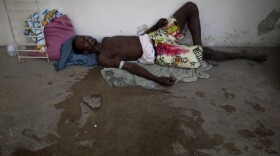
JJ Sutherland
JJ Sutherland covers the Pentagon for NPR. Since 2004 he has regularly spent time in Iraq as part of NPR's award-winning team of reporters and producers who have dedicated themselves to covering the conflict.
He won many awards for other coverage, which mean a lot to many journalists, but perhaps not so much to anyone else.
He has also reported from Afghanistan and the Israeli Lebanon war in 2006. In between overseas assignments, Sutherland was senior producer at large for NPR, working at just about every position in the building, from blogger to editor to producer to management.
Before covering conflicts, he was the founding executive producer of both NPR's midday newsmagazine Day to Day and The Tavis Smiley Show. As assistant managing editor, he opened NPR West in California.
Prior to coming to work at NPR he was the producer of WNYC's On The Media in New York, and also worked for WBUR in Boston.
He grew up in Denver and Boston, occasionally attended college, and has an only slightly disturbing affinity for bad science fiction.
-
The cholera outbreak in Haiti is only going to get worse. NPR spoke with Jacqueline Charles of the Miami Herald and she says people in the capital are terrified as they wait for the disease to reach Port-Au-Prince. At this point it seems inevitable.
-
President Obama called for a "new beginning" in relations between the U.S. and the Muslim world in a speech Thursday in Cairo. The speech was translated simultaneously into Arabic. An Iraqi family who watched the speech in Baghdad agreed with Obama that no single speech can eradicate years of mistrust.
-
Mystery writer Julie Smith offers a tour of the hauntingly Gothic city she calls home. New Orleans, says Smith, is a great place to write mysteries — not because of the city's crime, but because of its secrets.
-
The vice president visits Baghdad to pressure the Iraqi government to set aside factional squabbling and move ahead on resolving issues that sharply divide the country and fuel the ongoing sectarian conflict.
-
In Beirut, the exodus of foreigners is in high gear as fighting between Hezbollah and Israel continues across Lebanon. U.S. Marines landed in Beirut to help evacuate Americans. At the same time, Israeli bombing of targets in Lebanon continued and skirmishes between Hezbollah and Israeli soldiers again took place along the border.
-
Seven car bombs explode across Baghdad, killing at least six people and wounding dozens, as politicians meet to try to finalize a new Cabinet. Separately, police discovered the bodies of 20 Iraqis -- apparent victims of sectarian killings.
-
Tarmiyah, a town once remarkable for its heavy insurgent activity, has become a haven for Sunnis fleeing sectarian violence in Baghdad. More than a thousand families have moved there since the Samarrah bombing. The military controls all entrances and exits to the farming town, on the banks of the Tigris.

